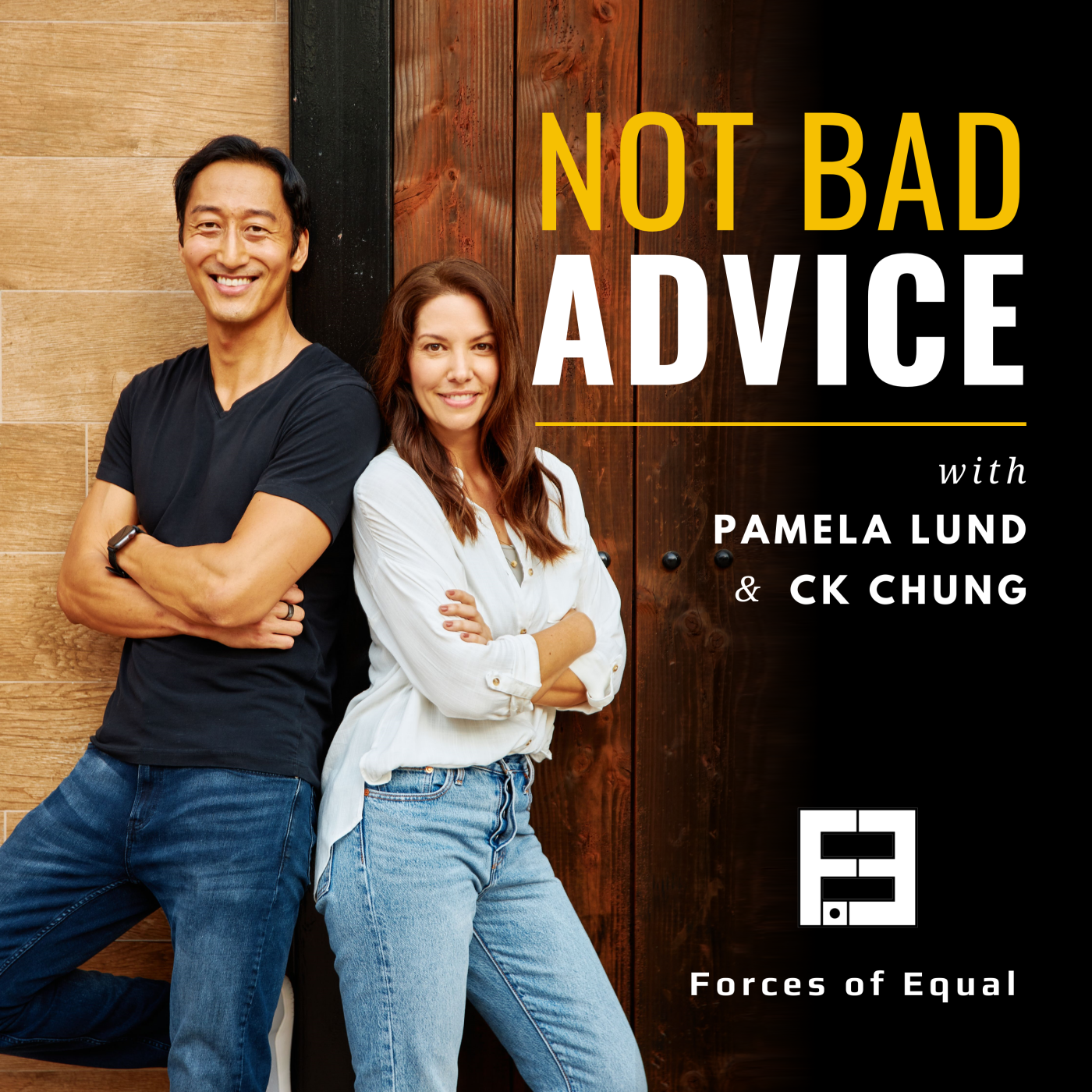How often do you stress yourself out over something, feeling anxious about what could happen or how other people will react, and then when you finally do the thing it turns out to be no big deal? What if you could stop feeling that way?
Need advice about something? Ask us here: https://forcesofequal.com/advice/
Transcript
Pam: [00:06] You’re listening to Not Bad Advice, where our goal is offer perspective that helps you improve one aspect of your life at a time.
[00:12] I’m Pamela Lund.
CK: [00:20] And I’m CK Chung.
Pam: [00:21] And we hope that after listening, you’ll think, “Hey, that’s not bad advice!”
[00:25] Today, we’re talking about uncertainty and how we cope with it. We deal with a lot of uncertainty, some of us more than others, but it’s a constant in life for everyone, and our brains really don’t like it. So we have coping mechanisms that make us feel like we’re in control.
[00:54] These coping mechanisms are how we rectify that we’re really not in control of very much that happens in our lives. Some days we feel like we’re in control, but the reality is the only things we ever really control are our own thoughts and actions. But when things are happening outside of our control, we still try to influence them.
CK: [01:14] Sometimes we don’t even control our own thoughts and actions.
Pam: [01:19] You can craft or develop control over thoughts or actions.
CK: [01:23] So that’s what we do have the ability to control.
Pam: [01:26] We have the ability to develop the control. Yes.
[01:31] There are a lot of things that happen every day that we just trust will happen the way they’re supposed to. Like, we have no way of knowing that the other cars will actually stop at the stoplight, but we trust that they will, because usually they do. So your experience has taught you that even though you can’t control what the other cars are doing, they will usually do what you expect them to.
[01:53] Trusting that things will happen the way they should is a way of coping with not actually being in control. If you had to think about whether every single car you encountered would stop before hitting you, you wouldn’t leave your house. So even though the uncertainty is there, you’re able to cope with it by essentially ignoring the possibility that things won’t happen the way they’re supposed to.
[02:18] On the flip side, there’s uncertainty that your experiences have shown you won’t turn out well. So even though you still have no way of controlling what other people do, you tell yourself that the outcome will be bad.
[02:30] If you’ve been turned down after a lot of job interviews, you tell yourself you won’t get this job either. Or, if you’ve had a string of bad dates, maybe you tell yourself that this next date won’t go well, either. That way, if things don’t go well, you were already convinced that they would turn out that way. So you didn’t experience that uncomfortable uncertainty. That’s a form of control, or a sense of control, anyway.
[02:56] Another way that we try to control things that we have no control over is by playing out all of the possible outcomes of whatever you’re dealing with in your head. You go through all of the “what-ifs” like, “What do I do if I do this thing, and this happens?” Or, if a medical test comes back with bad news.
[03:15] And we torture ourselves by thinking of all of the ways that things can go wrong, because we think we can mentally prepare for the worst. And if we do, that we’ll be able to handle whatever happens.
[03:27] But you can’t possibly anticipate every scenario that may happen. And no matter what you prepare for, it’s probably not going to be what really happens.
[03:37] How often do you stress yourself out over something, feeling anxious about what could happen or how other people will react, and then when you finally do it, it turns out to be no big deal? More often than not, I bet.
[03:49] And even when the worst outcome actually does happen, it won’t feel any better just because you spent a bunch of time worrying about that bad thing happening. Rehearsing the future doesn’t change it or change how you feel when it comes. Nevertheless, your brain wants to feel in control. And you get to train it how to do that.
[04:10] Like I said at the beginning of the show, the only things you really have control over are your thoughts and actions. So to retrain your brain so that you can stop doom-scrolling through scenarios in your head, you first need to just become aware of when you’re trying to predict outcomes that you can’t control. And once you start looking for it, you’ll notice just how often you do it.
[04:32] Once you realize you’re getting anxious or worried about something you can’t control. Take a second to acknowledge what your mind is doing. You don’t want to just shut the thoughts down. You want to process what you’re feeling.
[04:46] You might say something to yourself, like, “I’m anxious about the reply I’ll get to the email I just sent, so I’m predicting what the reply will be, even though I can’t control it.” Paradoxically, sometimes just recognizing that you can’t influence the outcome will alleviate some of that anxiety, because most of the anxiety comes from thinking over and over about what might happen.
[05:09] If you can stop that thought cycle and stop trying to predict what will happen, you can alleviate some of the anxiety.
[05:16] To alleviate more of it, redirect your focus. You can only actively think of one thing at a time. So if you’re focused on something else, you’ll get a break from the anxious thoughts. Every time you feel yourself pulled back to them, become aware of it, and redirect your energy again.
[05:35] This is chop wood, carry water stuff. You focus on what is immediately in front of you and what you can do and let the rest go. This is just another form of mindfulness and presence of mind, so that you’re connected to what is really happening now rather than what you imagined may happen later.
[05:54] And the process won’t be easy at first. You have to train this like a muscle. But with practice, you’ll be able to let things go more easily.
[06:03] The more you can let go of that need to control what you really can’t control, the more energy you’ll have to focus on the things you want to accomplish, and the more willing you’ll be to take risks that you would have been too afraid to take before. You’ll be calmer, happier, and we’ll actually get better outcomes by letting go of the need for control.
CK: [06:26] Okay. So I’m trying to square this with a concept called mental contrasting. And this is a psychological concept where it’s beneficial for you to think of obstacles and potentially negative outcomes in order to proceed with your plan or your goal.
[06:50] So when is it beneficial to prepare and perform like a pre-mortem, per se, versus not getting hung up on these obstacles?
Pam: [07:02] Well, I think that in your question, you answered it, which is that if you are planning for something, if you’re striving for a goal, you need to look ahead and say, “these are the possible outcomes, here’s what I can do to meet those outcomes and avoid the negative outcomes.”
[07:17] You have some control in those steps. You still have some agency there. You still have something that you can control to. avoid the potentially negative outcomes.
[07:27] Whereas if you have sent an email to someone, you have absolutely no control once it has been sent – once you’ve done your due diligence and crafting it, and all of the things that you have control over – but once it’s been sent, you have absolutely no control over what the person on the other end is going to reply with.
CK: [07:43] Right. Okay. So it’s more of a factor of determining, I guess, as you’ve said, what you can control and what you can’t. So maybe there’s that dimension with every task, for instance, in terms of the email, you can’t control the response or how the recipient’s going to respond, but you can control what you do, whether or not they respond.
Pam: [08:11] Correct. You have control over how you write the email, what you say in the email, and you can think ahead to their response before that, because you’re still within your locus of control over you handle the situation that you’re in.
[08:26] Once it is out of your control, if you spend all of your energy cycling through all of the potential negative incomes that you really have no influence over that’s
CK: [08:41] So what I’m thinking is that with the strategy of mental contrasting, would it be beneficial to try to determine what you’re going to do?
Pam: [08:51] So, there’s a certain point where you are in planning mode and you are saying if X happens, I will do Y. But I think we’ve all experienced the point where you just go into a spiral of dread about what is going to happen and it’s not productive.
[09:12] So I think maybe that’s real difference here is if you are having strategic thoughts and planning that “if X happens, I will do Y,” that can be productive.
[09:23] If you’re simply panicking over what is going to happen and getting yourself all worked up, and that is only destructive, it’s not productive, then that’s where the mental contrasting of, like, thinking of the worst case scenarios is not helping you.
CK: [09:42] Right. So mental contrasting has to be coupled with the idea of what you can and can’t control.
Pam: [09:49] I think that it does, or else you’re just thinking of the worst case scenario for no reason other than to torture yourself. As always. Everything that talk about here involves personal responsibility and awareness, and knowing what’s good for you and what the situation calls for. So these are all just tools that you can put into practice, and if you find yourself in a situation, you can kind of step back and say, “is this helping me?”
[10:15] And “I have these three tools that I’ve learned… which tool is going to help me in this case?” maybe it’s mental contrasting, maybe it is distraction, maybe it is positive thinking. What, things right now is going to help me, and maybe try them all.
CK: [10:33] Right.
Pam: [10:35] Good question.
[10:37] Your Oracle card representation of today’s message is the lavender card from the Nocturna oracle deck.
[11:27] Lavender has a long history of being used as a medicinal plant. And it’s associated with relaxation, serenity, and calm.
[11:36] So lavender reminds us that we can access calm at any time. You can choose to practice presence and stillness. You can choose to focus on what you can control and on feeling centered. You can create internal serenity.
[11:52] You don’t have to wait for external circumstances to change, which turn out in a certain way. You can choose to cultivate calm thought patterns so that you can access serenity whenever you need it.
[12:05] If you found yourself thinking, “Hey, that’s not bad advice,” while listening today, giving us five stars in iTunes is a quick, easy, and free way to show your support.
[12:19] You can get in touch with us on Twitter, where I’m @Pamela_Lund and CK is @cKdisco. If there’s something you need advice about, visit ForcesOfEqual.com/Advice and we may feature it on the show.






